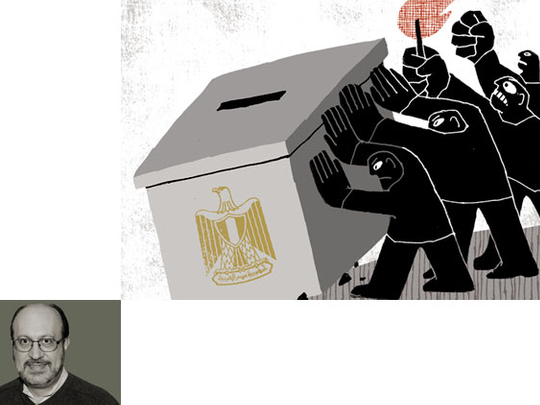
Port Saeed, Suez, and Esmailiya —to name just three Egyptian cities that witnessed the latest waves of unrest in Egypt — are now under a month-long curfew from 9pm to 6am. Demonstrations continued in Cairo and Alexandria, while an increasingly shaky President Mohammad Mursi called on his political challengers to participate in a national dialogue, which was a non-starter for the opposition.
After a year of nonchalant experimentations with the constitution, frustrated Egyptians blamed the president for allowing members of the Muslim Brotherhood free rein to impose their will on state institutions. Inasmuch as few accepted to be bamboozled while awakened officials rejected additional restrictions, was Egypt about to implode?
Although impossible to generalise, the mere fact that citizens resorted to violence, confirmed that a growing number were no longer willing to trust the country’s institutions, including its heretofore relatively independent courts.
The fact that perhaps as many as 25 women were sexually assaulted in Cairo’s Tahrir Square demonstrations last week, with several stripped naked, one raped and others groped while authorities essentially stood by, highlighted the malaise that Egyptians felt towards the police.
A new group, the so-called Black Bloc anarchists, men and women who wore facemasks and black clothing, added to the folklore. Although Brotherhood minions spread rumours about Black Bloc, allegedly because anarchists wished to increase intra-religious tensions, such a presence was not a good omen for Cairo as street clashes fizzled out in late 2012 only to reemerge in early 2013.
Interestingly, Egyptian revolutionaries who had previously abandoned all hope for change, rallied around Black Bloc elements as police forces fired tear gas at rock-throwing protesters in the capital after Mursi declared a state of emergency in selected provinces.
Equally remarkable was Cairo’s inabilities to engage leading opposition figures in any meaningful dialogue, which further polarised society. In fact, members of the National Salvation Front led by Mohammad Al Baradei, made several new demands, including serious reforms to the constitution as well as the formation of a new salvation government.
Al Baradei stressed that if the Front’s “legitimate” demands were not met soon, he would call on Egyptians to return to the streets and protest peacefully. In his inimitable words, Al Baradei, tweeted to his followers: “Unless the president takes responsibility for the bloody events and pledges to form a government of national salvation and a balanced committee to amend the constitution, any dialogue will be a waste of time.”
For his part, Hamdeen Sabahy, a former presidential candidate, announced that he would not attend “unless the bloodshed stops and the people’s demands are met”, which ensured a no-show. “We aspire to a dialogue, but there are no guarantees that this dialogue will be a success ... while blood is being spilled,” affirmed Sabahy who demanded that Interior Minister Mohammad Ebrahim be fired over the deaths of so many protesters.
Unremarkably, a meek official response to grant the military authority to arrest civilians, failed to make a dent in the ongoing violence. Indeed, by granting the armed forces arrest powers, which were of the temporary nature last December but that now took on a more permanent aspect, Cairo added to its overall governance burden.
Even if one were to assume that Mursi had the innate skills to rule Egypt, his preferences to date sharply polarised Egyptian politics, and although Brotherhood candidates swept to victory in both of the 2012 parliamentary as well as presidential elections, his desires to expand the president’s powers and fast-track a constitution with an Islamist hue through a referendum, illustrated his cavalier approach to democratisation.
Critics emphasised that Mursi was not an independent thinker, and that all of his utterances and decisions were those of the Supreme Guide, the 69 years-old veterinarian Mohammad Badie — who was also known as ‘AlMurshid’ (Arabic for ‘the guide’) — who ensured that the head of state was nothing more than a mere puppet.
Observers of the Egyptian scene insisted that the commander-in-chief only listened to his Islamist friends, and may well have reneged on a pledge to be a president for all Egyptians, which was telling. Whether Badie or Mursi heard the frequent ‘Down, down with the Guide!’ chants was also valuable to know although such a constatation was impossible to verify.
Be that as it may, Cairo today confronted an existential dilemma: beyond the devotion of a spiritual leader or that of millions of members who asserted their conservative religious identities, Egypt’s salvation did not only lie in its religious or customary duties. Rather, it also important for young Egyptians to assume their fair share of responsibilities, and add productive value to their society by improving the overall standard of living.
While every salvation was not divine, the return of the state of emergency — even if currently limited — did not bode well because Cairo’s main problem was to address genuine economic grievances. As long as the country performed poorly in this vital sector, and even if one were to partially blame the opposition for adding to overall tensions, it behooved officials to address socio-economic concerns above all other considerations. Short of that, Egypt was destined for years of chaos, with ripple effects throughout the region.
Dr Joseph A. Kechichian is the author of Legal and Political Reforms in Saudi Arabia.











